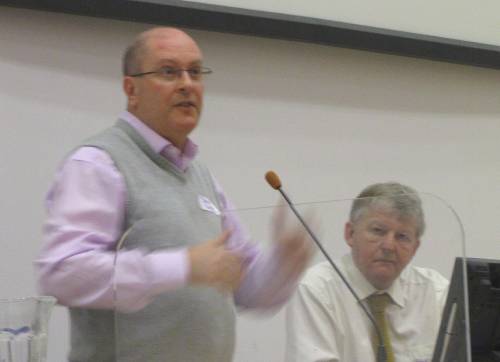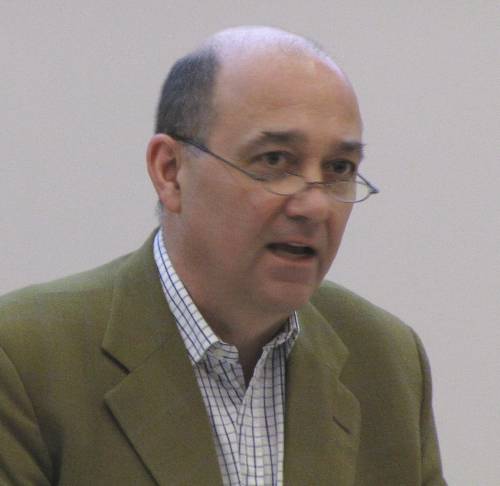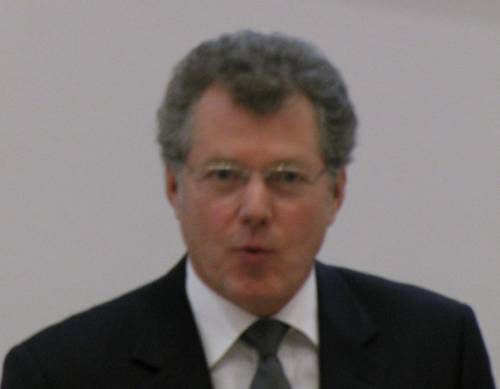On Saturday 12th March, people from across our Diocese gathered at the National Science Centre in York for a Day Conference entitled ‘Big Society or Broken Britain’.

Chaired by Bishop Terry, the Conference opened with a rousing presentation by Ampleforth old boy and HBOS ‘whistle-blower’ Paul Moore, who outlined the reasons he, a person in a particularly well-informed position, being former head of global risk at HBOS, believed had led to the current banking crisis.

Paul went on, through an explanation of elements of Catholic social teaching ranging from ‘Rerum Novarum’ (Pope Leo XIII’s 1891 encyclical on capital and labour) and up to Pope Benedict’s recent ‘Caritas in Veritate’, to propose a new mission, which he called ‘Faithonomics’, intended to be “the Voice of the great Faiths of the world on money, markets and the economy”. Developing this idea, Paul stated that in the modern developed world “the love of money and me is at the centre of everything. We have become spellbound by and addicted to the deadly sins of greed, pride, vanity, envy, gluttony and lust. These have been portrayed to us in the mass media as the only way to freedom, peace and happiness”. He called this “a type of metaphorical or metaphysical slavery” and pointed out that this “aggressive secularism, materialism, consumerism and moral relativism” has “excluded, driven away and just plain ‘poo-pooed’ the beautiful and divine balance that the Voice of Faith brings to the public policy debate”. He praised the incredible work of the Catholic Church in its Social Doctrine including ‘Caritas in Veritate’ and reminded us that Pope Benedict had spoken so eloquently about this on his visit to the UK.
In contrast, the second keynote speaker, Lloyd Clark, adopted a more secular tone. Lloyd, a former senior police officer, is a member of Sir Christopher Kelly’s ‘Committee on Standards in Public Life’ and has investigated alleged corruption by elected officials and public office holders.

Lloyd outlined the seven principles of public life originally proposed by Lord Nolan (the Committee’s first Chair), and noted that countries where these were missing are “not nice places to live”. These characteristics for the behaviour of every holder of public office are “selflessness, integrity, objectivity, accountability, openness, honesty and leadership”, pointing out that these are – or ought to be – the bedrock of our country’s public service ethos.
There followed an informative and amusing recalling of incidents over the last 100 years when such principles were not adhered to. The changing standards of journalism over the same period was also noted.
Lloyd concluded his excellent presentation by noting that Lord Nolan’s principles were very similar to those written down in 1975 by Nelson Mandela in Kroonstad Prison. Mandela concluded by writing “Never forget that a saint is a sinner who keeps on trying”.
After lunch, delegates had a choice of workshops to attend.
“There are more people sleeping rough on the streets of Middlesbrough than there are on the streets of Durham, Sunderland and Newcastle combined”. Terry Doyle’s introduction to his workshop certainly grabbed our attention. Terry, a parishioner of St Andrew’s in Teesville and an Oblate of the World Community for Christian Meditation, works with drug users on Teesside. One delegate commented “I went to Terry Doyle’s workshop on the drug problems. An excellent presentation from a very committed individual. His description of himself and what he did was very enjoyable and informative – it raised lots of interesting points for discussion”. I could have listened to him all day.
The final workshop I attended was about CAFOD’s Parliamentary work, something which I knew little about beforehand.
An excellent day. As one delegate commented “All the speakers were relevant; so interesting and motivational”. Another added “It is always enjoyable (and a privilege) to listen to those who are seeking to act from faith-inspired and experience-informed principles. Much to reflect on in both presentations and speaker-led workshops”.
Brian Dowd
